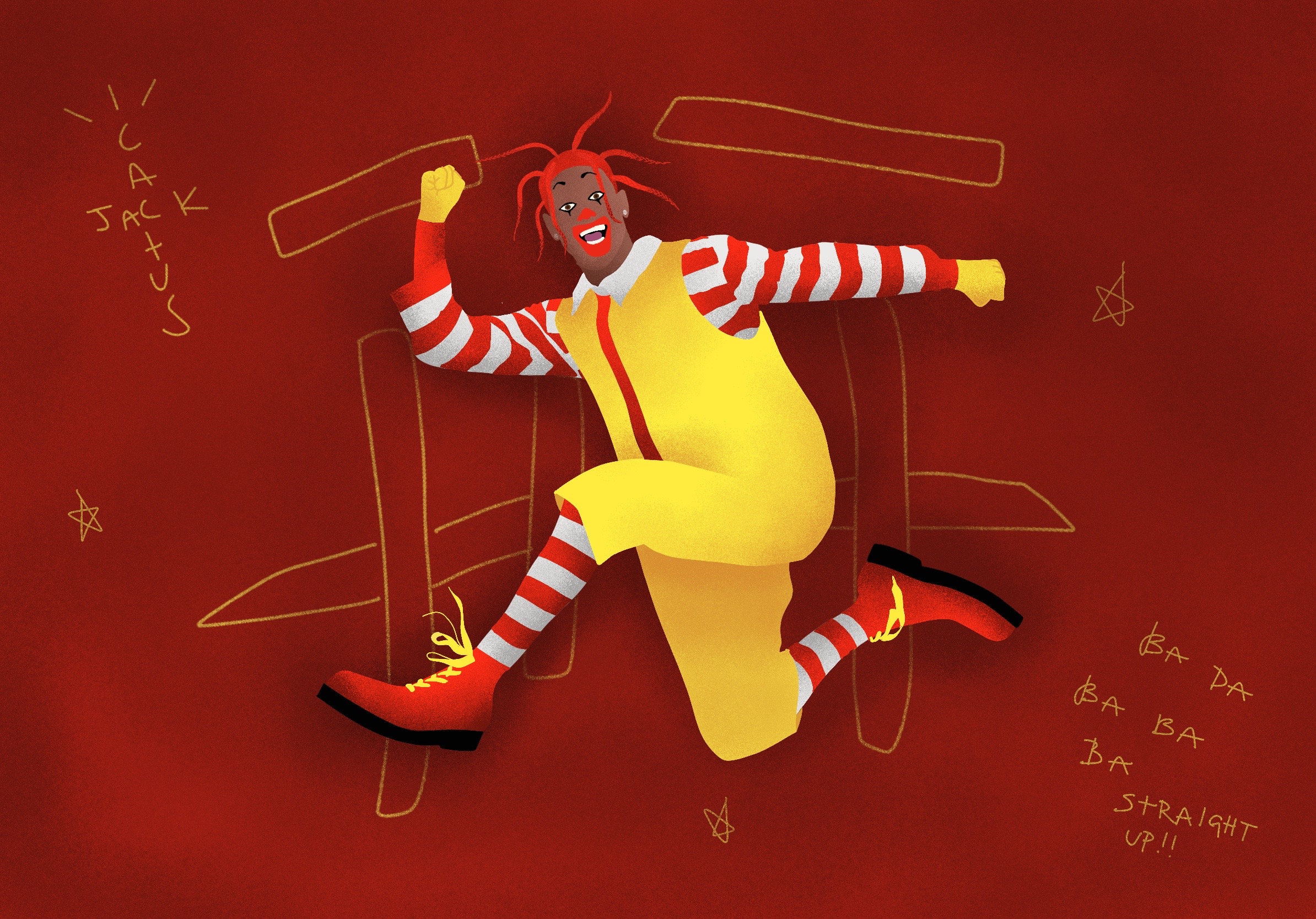Travis Scott’s transformation from rapper to music oligarch to meme proves that money always beats art
It’s about 1 a.m. and you and your friend Tanner are driving to get food after a long night. As you both approach the golden arches of a local McDonald’s in a beat-up Honda Civic, you decide to connect your phone to the aux. Presented with a myriad of new albums and singles to listen to, you know there’s really only one song you can play.
Once the drive-thru worker asks for your order, you pause, just long enough to add dramatic effect, and whisper, “you know why I’m here.” “Sicko Mode” starts playing.
“Cactus Jack sent me,” you add.
While this seems like a soap-opera dramatization of the ordering, it’s actually not that far off from what’s really happening. In case you haven’t been following, Travis Scott recently announced a collaboration with McDonald’s in which the fast-food giant is trying to sell a quarter pounder with bacon as a meal called “The Travis Scott.” And if you thought this might be the most ridiculous collaboration, you may very well be right.
This collaborative effort comes right off the heels of Scott’s puzzling song “The Plan” made specifically for Christopher Nolan’s new movie Tenet.
In the real world, people are getting yelled at by other McDonald’s customers for recording annoying TikToks of them ordering “The Travis Scott” meal. Others are parodying the stupidity of this whole affair, and some are spending their money buying the bland collaborative merch between Travis Scott and the enormous fast-food chain.
Travis Scott has transcended artistry. He is a business mogul and a meme now, all to his benefit. He can release a phoned-in feature and no one will care. He can drop the worst merch ever, including a chicken-nugget-themed-body-pillow, and get people to buy it. He can release a whole Netflix documentary, and the fans will eat it up like it’s an Oscar-nominated piece of work.
Despite this level of superstardom, Travis Scott feels less like a human being every year and more like a machine meant to satisfy your wants and needs than an actual person who cares about their craft.
And the worst part is that Scott’s music isn’t even all that terrible. Out of all his projects, there are only one or two entries that completely miss the mark. Days Before Rodeo, Rodeo, and Astroworld are good-to-great albums that show he can be fun and entertaining, if a little vapid.
But quality aside, Scott’s numbers began to hit the stratosphere after the release of his second album Birds in the Trap Sing McKnight, a record that took the world by storm with the inclusion of the Kendrick Lamar-assisted hit, “Goosebumps.”
This was the beginning of the rise of Travis Scott, the meme.
Travis Scott was everywhere. There wasn’t a single on the album that he couldn’t have pushed more. At the time, he seemed primed to at least compete with Drake and Kendrick for being one of the most commercially successful artists.
Then came Fortnite, the massive battle royale game that had the world entrenched in its complex yet accessible gameplay. Following a few years of success, Fortnite itself transcended being a game. In fact, it halted the actual battle-royale aspect of the game for a few evenings when they announced a live, in-game Travis Scott concert.
Obviously, Scott wasn’t performing on a stage inside the game’s only level, but it was an expensive psychedelic experience akin to a Travis Scott video that had a number of my friends ask me to virtually go with them. To these friends, I’m sorry I had to say no.
But just because his music is accessible doesn’t mean it should be thrown everywhere. To be a Travis Scott fan in 2020 is to not just enjoy his music, but to enjoy and, without any doubt, gobble up everything this man has to offer.
And this is the problem with how we treat artists. We give them all the platforms they can use because the bottom line is obviously money. The music business is still a business, after all. But Travis Scott seems to have traded all his humanity for an increasing slew of income, even if it means dropping cop-out merch and sending features to other artists that should’ve stayed in the vault.
With this Travis Scott obsession taking over the world, the resale value of anything Travis Scott-related has become astronomical. His collaborative effort with Reese Puffs, which is literally Travis Scott branding on their usual cereal boxes, at one point sold for $400 on eBay, while some listings still have it at over $200 CAD. Teens are stealing the Travis Scott burger posters. To his fans, Travis Scott is a god.
Treating artists like deities has proven to have a horrible track record, but Travis Scott is perhaps beyond even being a deity. Maybe he’s the Zeus to Drake’s Ares, but even Drake knows his limits.
It’s interesting to watch this development (and collapse if you’re not as big a fan of his music) because he was and still is a mogul in hip hop and mainstream pop. But if there’s one thing Travis Scott won’t do, it’s giving up the spotlight. He lives in it and would never relinquish it. He might know the cost, but let’s be real, he absolutely does not care. We should stop caring too.
Graphic by @the.beta.lab
